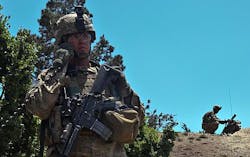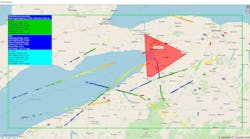Officials of the U.S. Defense Advanced Research Projects Agency (DARPA) in Arlington, Va., are awarding a $903,728 contract to HRL Laboratories for the Wireless Network Defense program to ensure reliable wireless communications in areas lacking a trustworthy communications infrastructure.
In areas without a solid communications infrastructure, military forces rely on wireless networks with nodes that coordinate among themselves to manage resources, such as spectrum and power, and determine the best configurations to enable sharing of information, DARPA officials explain.
Typically these networks trust all information they share about the security and status of each node and the network as a whole. As a result, inaccurate information can bring the network down quickly.
DARPA experts are asking HRL Laboratories to develop new protocols that enable military wireless networks to remain operational despite inadvertent misconfigurations or malicious compromise of individual nodes.
“Current security efforts focus on individual radios or nodes, rather than the network, so a single misconfigured or compromised radio could debilitate an entire network,” says Wayne Phoel, manager of the DARPA Wireless Network Defense program.
“We need to change how we control wireless networks by developing a network-based solution for current and future systems that acknowledges there will be bad nodes and enables the network to operate around them,” Phoel says.
DARPA is asking HRL develop protocols that determine the viability and trustworthiness of neighboring nodes and adapt the network automatically to operate through problems.
“Credit card companies use various indicators for trying to determine if someone has stolen your credit card and is posing as you,” Phoel says. “Unexpected purchase locations, amounts and other factors could raise an alert.”
The first phase of the Wireless Network Defense program, on which HRL Laboratories is working, has three technical areas: wireless network vulnerability assessment; information reliability estimation; and robust network control.
For more information contact HRL Laboratories online at www.hrl.com, or DARPA at www.darpa.mil.



